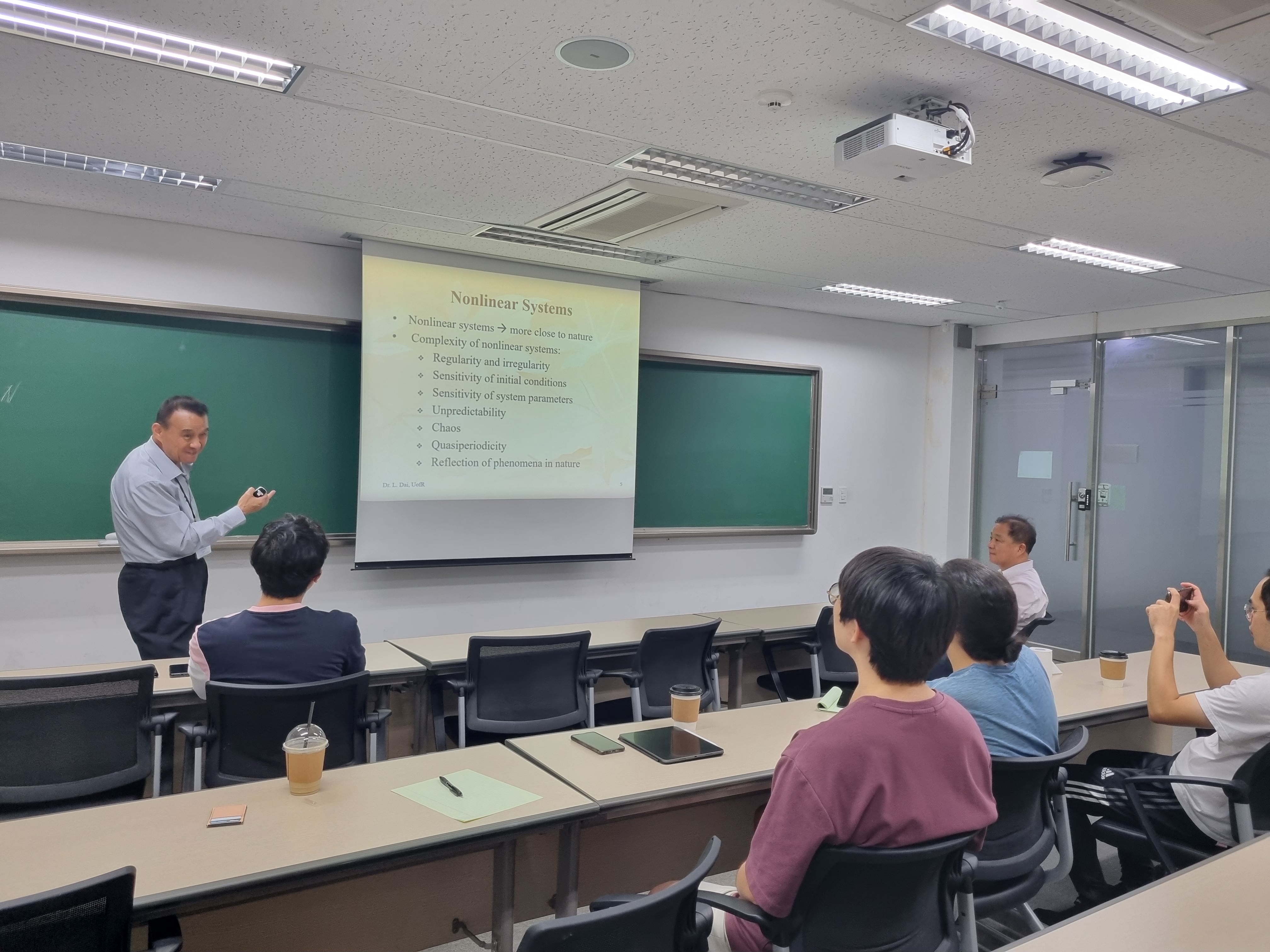Prof. Young-Heon Kim, from University of British Columbia, visited HYKE on 10th October. He gave us an interesting talk about his overall research, especially “optimal transport”.
The presentation file can be found in PDF
Category: Invited talks
HYKE Seminar – Invited Talk by Liming Dai
Prof.Liming Dai visited HYKE on 17th August. We had lunch and the nice seminar in SNU. The presentation file can be found in PDF




[Invited Talk] Interfaces between Kinetic Models of Collective Phenomena and Data Science
There will be an invited talk.
Title: Interfaces between Kinetic Models of Collective Phenomena and Data Science
Speaker: Mattia Zanella (Department of Math, The University of Pavia)
Time: 2023 January 13th(Fri.), 10:00 ~ 12:00
Place: 27-325
Abstract:
Kinetic equations play a leading role in the modelling of large systems of interacting particles/agents with a recognized e ectiveness in describing real world phenomena ranging from plasma physics to multi-agent dynamics. The derivation of these models has often to deal with physical, or even social, forces that are deduced empirically and of which we have limited information [4, 5]. Hence, to produce realistic descriptions of the underlying systems it is of paramount importance to manage e ciently the propagation of uncertain quantities across scales. In this course, we concentrate on the interplay of this class of models with collective phenomena in life and social sciences, where the assessment of uncertainties in data assim- ilation is crucial to design e cient interventions [2, 7, 8]. Furthermore, we present several classes of numerical methods for kinetic models with uncertainties, see [3] and the references therein. Finally, we discuss the construction of novel schemes that are capable of achieving high accuracy in the random space without losing nonnegativity of the solution [1, 6].
[1] J. A. Carrillo, L. Pareschi, M. Zanella. Particle based gPC methods for mean- eld models of swarming with uncertainty. Commun. Comput. Phys., 25(2): 508-531, 2019.
[2] G. Dimarco, B. Perthame, G. Toscani, M. Zanella. Kinetic models for epidemic dynamics with social heterogeneity. J. Math. Biol., 83, 4, 2021.
[3] S. Jin, L. Pareschi. Uncertainty Quanti cation for Hyperbolic and Kinetic Equations, SEMA-SIMAI Springer Series, vol. 14, 2017.
[4] A. Medaglia, G. Colelli, L. Farina, A. Bacila, P. Bini, E. Marchioni, S. Figini, A. Pichiecchio, M. Zanella. Uncertainty quanti cation and control of kinetic models of tumour growth under clinical uncertainties. Int. J. Non-Linear Mech., 141:103933, 2022.
[5] A. Medaglia, L. Pareschi, M. Zanella. Stochastic Galerkin particle methods for kinetic equations of plasmas with uncertainties. Preprint arXiv:2208.00692, 2022.
[6] L. Pareschi, M. Zanella. Monte Carlo stochastic Galerkin methods for the Boltzmann equation with uncertainties: space-homogeneous case. J. Comput. Phys., 423:109822, 2020.
[7] A. Tosin, M. Zanella. Uncertainty damping in kinetic tra c models by driver-assist controls. Math. Contr. Relat. Fields, 11(3): 681-713, 2021.
[8] M. Zanella, C. Bardelli, G. Dimarco, S. Deandrea, P. Perotti, M. Azzi, S. Figini, G. Toscani. A data- driven epidemic model with social structure for understanding the COVID-19 infection on a heavily a ected Italian Province. Math. Mod. Meth. Appl. Scie., 31(12):2533-2570, 2021.
HYKE Seminar – Invited Talk by Tong Li
[Invited Talk] Hyperbolic-parabolic PDE Models of Chemotaxis
There will be an invited talk.
Title: Hyperbolic-parabolic PDE Models of Chemotaxis
Speaker: Tong Li (Univ. of Iowa)
Time: 2022 December 23th, 15:30 ~ 16:20
Place: 27-325
Abstract:
We study global existence and long-time behavior of solutions for hyperbolic-parabolic PDE models of chemotaxis. We show the existence and the stability of traveling wave solutions to a system of nonlinear conservation laws derived from the Keller-Segel model. Traveling wave solutions of chemotaxis models with growth are also investigated. Moreover, we find oscillatory traveling wave solutions to an attractive chemotaxis system which are biologically relevant.
[Invited Talk] Fredholm Property of the Linearized Boltzmann Operator for a Mixture of Polyatomic Gases
There will be an invited talk.
Title: Fredholm Property of the Linearized Boltzmann Operator for a Mixture of Polyatomic Gases
Speaker: Marwa Shahine (Univ. of Bordeaux)
Time: 2022 November 11th, 15:00 ~ 16:00
Place: 27-325
Abstract:
In this talk, we consider the Boltzmann equation that models a mixture of polyatomic gases assuming the internal energy to be continuous. Under some convenient assumptions on the collision cross-section, we prove that the linearized Boltzmann operator L is a Fredholm operator. For this, we write L as a perturbation of the collision frequency multiplication operator. We prove that the collision frequency is coercive and that the perturbation operator is Hilbert-Schmidt integral operator.
[Invited Talk] Reinforcement Hedging
There will be an invited talk.
Title: Reinforcement Hedging
Speaker: Kiseop Lee (Professor, Purdue University)
Time: 2022 December 2ed, 16:00 ~ 16:50
Place: 27-325
Abstract:
We investigate option hedging in an incomplete market with a reinforcement learning algorithm called double deep Q-network (DDQN). The agent of DDQN learns the optimal policy that generates replicating portfolios without prior knowledge of the stochastic representation of an underlying asset price process. First, we interpret a mean-variance approach in quadratic hedging in a reinforcement learning framework. This study includes three simulation studies for different underlying asset price processes: geometric Brownian motion (GBM), Heston, and GBM with compound Poisson jumps. For each study, a DDQN agent learns the optimal policy, and we compare the algorithm performance with delta hedging. Second, we discuss limitations that stem from the structure of reinforcement learning in finance.

